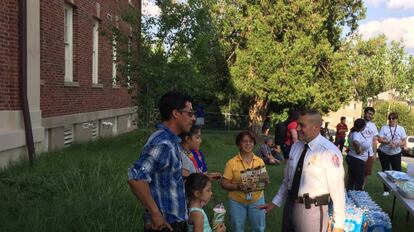Promoting reconciliation between police and communities in turbulent times
The goal of National Night Out is to foster good relationships between minority communities and law enforcement

“The kids are afraid of us. We gain their trust by talking to them,” said Joe Pérez, a police captain in Prince George’s County, an area just outside of Washington, D.C. Pérez walked around greeting the residents of Langley Park, most of them Latinos. The neighborhood was celebrating National Night Out, an event that brings members of minority communities and police officers together for a few hours once a year in an attempt to strengthen ties and promote crime reduction.
Several cases of police violence against African Americans over the last few years have raised tensions and reopened the debate around the role race plays in the United States. The Hispanic community is the second group hardest hit by police brutality. That is why meetings that promote trust between police forces and this community are so important, said Renato Mendoza, an advocacy specialist at CASA Maryland who oversees National Night Out activities in the state.
“We want the police to respect us and we want to respect them,” one of the event’s organizers told the public.
The soirée began with a parade. Under the fervent sun of the early days of August, a police car with sirens blasting led the march, followed by a band and a group of young dancers. Youths and elderly people, men and women, watched the procession from the balconies of the apartment buildings that line the streets. “Come on, come on!”, a woman in the parade said in a failed attempt to encourage them to join in.
Pérez, a native Puerto Rican and president of a national association for Hispanic police officers, had his own mission. After every few steps, he crossed the street to greet people on the sidelines. Many were youths and children who were obviously thrilled with the attention the police gave them. “How are you?” he asked each one. Eradicating crime and overcoming mutual distrust between the community and authorities must come from personal interactions and trust between individuals, the veteran police officer said.
“Events like this show and promote closeness between Langley Park’s Hispanic community and the police,” said William Alexander, Commander at District 1 Station. “We want the police to respect us and we want to respect them,” one of the event’s organizers told the public.
Building trust is a work in progress, Mendoza added. This neighborhood is grappling with gang violence and therefore requires police intervention, he said. But an exaggerated response from authorities may provoke undesired effects. “The militarization of the police in the United States is something that can scare our Hispanic community,” he warned. The key, Pérez said, is a good relationship with the local police that, in this case and in this community, has made it easier for local authorities to feel safe enough to ask for more police patrols in problematic areas.
Sign up for our newsletter
EL PAÍS English Edition has launched a weekly newsletter. Sign up today to receive a selection of our best stories in your inbox every Saturday morning. For full details about how to subscribe, click here
The sun was already setting on the homes where hundreds of poor families, legal and undocumented residents live, when the parade and speeches ended. But the list of activities went on: a soccer tournament, a basketball competition, an inflatable castle for the small kids and then a movie to close out the night. Men and youths who had just come home from work stood around the soccer field watching the game.
Julio has worked in construction since he immigrated from Guatemala when he was 17 years old. As he stood with his back leaning against the hood of an old black car, he held his three-year-old son, Kenny, in his arms and kissed him every minute or so. The relationship between the community and the police, he said, is simple. It depends on whether you get yourself in trouble or not. For me, no problem. But not for others.”
English version by Heather Galloway.
Tu suscripción se está usando en otro dispositivo
¿Quieres añadir otro usuario a tu suscripción?
Si continúas leyendo en este dispositivo, no se podrá leer en el otro.
FlechaTu suscripción se está usando en otro dispositivo y solo puedes acceder a EL PAÍS desde un dispositivo a la vez.
Si quieres compartir tu cuenta, cambia tu suscripción a la modalidad Premium, así podrás añadir otro usuario. Cada uno accederá con su propia cuenta de email, lo que os permitirá personalizar vuestra experiencia en EL PAÍS.
¿Tienes una suscripción de empresa? Accede aquí para contratar más cuentas.
En el caso de no saber quién está usando tu cuenta, te recomendamos cambiar tu contraseña aquí.
Si decides continuar compartiendo tu cuenta, este mensaje se mostrará en tu dispositivo y en el de la otra persona que está usando tu cuenta de forma indefinida, afectando a tu experiencia de lectura. Puedes consultar aquí los términos y condiciones de la suscripción digital.








































